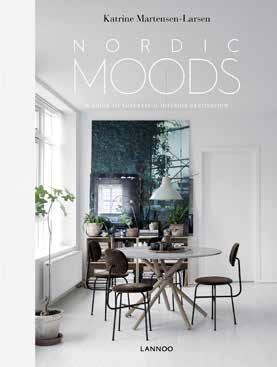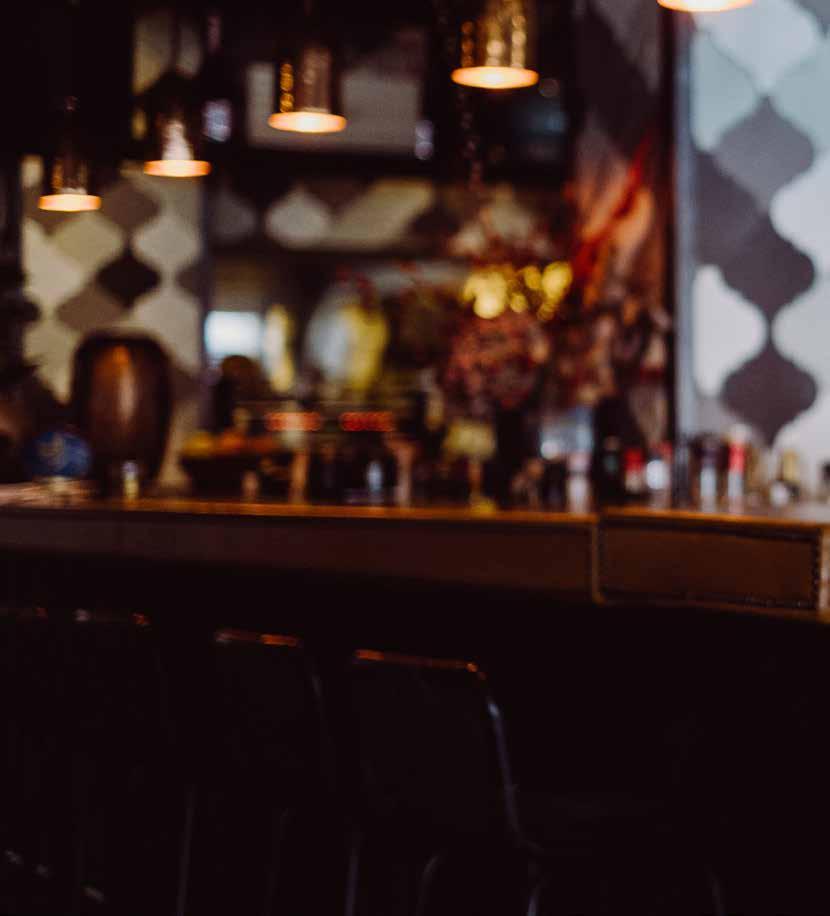
10 minute read
Work hard, play hard’ with Sepideh Sedaghatnia
A conversation about perseverance, letting go and living in the here and now
SEPIDEH
Advertisement

Sepideh Sedaghatnia is 35. She was born in Shiraz and grew up in Isfahan. She moved to Belgium with her parents and sister when she was 17. Although her father had envisioned a future in the petrochemical industry, she resolutely chose to go into the hospitality industry. After graduating from hotel school, she headed to the French wine university Suze-La-Rousse to train as a sommelier.
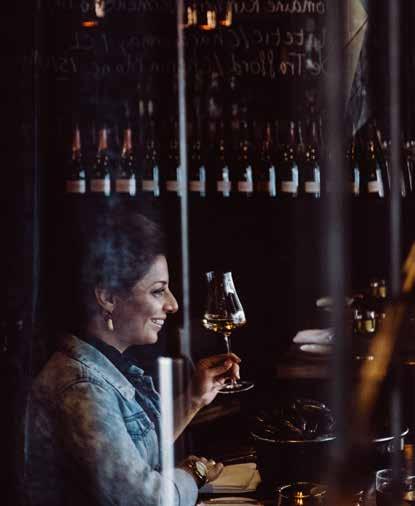
10 We arrive a little late for our appointment in Divin and find Sepideh Sedaghatnia – 'Call me Sepi!' – behind the bar. In a grey apron and bright orange top, she deftly shakes colourful cocktails. The gastrobar is still closed, but we are second in line. These long drinks are for the photographer and journalist who are doing a story before us. Between dictating cocktail recipes, posing for a photo shoot and checking on reservations, Sepideh gives the team suggestions for the evening service. If you ask me, Sepideh is the very picture of multitasking. This business owner waltzes through her bar - and life - like a good glass of wine in your hand.
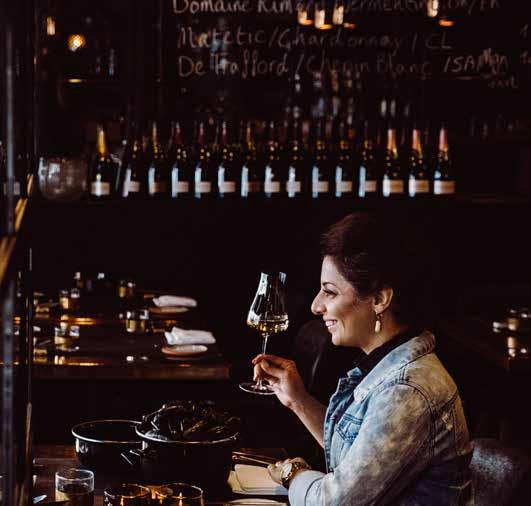
'The same haircut in two different shoots is repetitive enough,' she says, laughing. An unwavering eye for detail, that's for sure. She's been tackling one appointment after the other since 9 o'clock this morning. Just before the restaurant opens – unfortunate timing on our part – I sit down with her at one of the carefully laid tables.
'I often put in long hours. I insist on finish ing up with the team every night, so I never get to bed before 3 o'clock.' And yet she makes it clear that she thinks it's terrible that the hospitality industry always gets a bad rap because of the difficult hours. This Belgian beauty with Iranian roots started out washing dishes and learned to appreciate every part of restaurant life along the way. 'You won't hear me com plaining: we've really got a dream job. What other job allows you to share the wonderful moments people experience Starting your own business isn't easy, particularly if you're not in the kitchen yourself. Then you've got to hand over the reins: that's not easy for a seasoned control freak,' she laughs. 'But you learn from your mistakes, and through trial and error, you find your way forward. It's a daily exercise, in which you constantly have to work on your business and yourself.'
like this? Our customers have usually got something to celebrate, or they're spending time with their family and friends, enjoy ing the best things in life: food and drink. Hospitality is an industry unlike any other. And irregular hours have an upside, as well. On Tuesdays and Wednesdays, when everyone else is at work, we enjoy a day off, with a glass of champagne. Work hard, play hard.'
A motto that really embodies the 2014 Sommelier of the year. Sitting still isn't for her. Calling Sepideh a wine connoisseur doesn't come close to covering it: she is a media figure, restaurant owner, author of 3 books, owner of her very own caviar line and so much more. An entrepreneur through and through, who decided to start her own business in 2015. 'I'm very happy with the course I've taken with Divin. But it certainly has been difficult, as well.
High-performance hospitality
'The most important thing is to surround yourself with the right people, and it took time for me to do that. But if I were to do it all over again, I would have made exactly the same choices.' When I ask her what is the hardest part of entrepreneurship, she doesn't hesitate for even a second. 'Belgian regulations! They make it so hard on us. They should really think about that, be cause believe me: without the hospitality industry, you'd have a lot of depressed people round here,' she laughs.
Life in the hospitality industry is like a professional sport. It takes discipline and dedication to put in the hours needed. 'My father really drummed that into us. He really knows how to persevere. He rebuilt his entire life from scratch three times. The choice that he made, years ago, to create a freer life for us here, in Europe, wasn't an easy decision. I really admire his decisiveness.'
Time for me time
'Thanks to my parents, I know that if you want to achieve something, you've got to make sacrifices. And I sacrifice a lot of time that I could be spending with my family and friends. But I want this too much. I love my family incredibly much, but sometimes there are weeks when I can't even find the time to ring my mum. I can feel very guilty about that, but she always responds with endless understanding. In the busiest periods, I also notice that I'm better off spending time by myself. Me time is not appreciated nearly enough. Ultimately, you are the key to your own success. If that key breaks, no more doors will open for you.'
'In Iran, families are much closer-knit. You see everyone every week, even cousins. Here, in Belgium, many families talk once a year over Christmas dinner. I fall somewhere between the two right now, but it's still a difficult balancing act between work and private life.'
She thinks it's normal that not everyone always understands that. 'Your colleagues automatically become good friends: you share a passion and share the same work schedule. But I think it's very important to have friends outside of your working life, as well. Sometimes, you have to be able to step back from it.'
She worked as a sommelier for Viki Geunes and appeared on television alongside Sergio Herman. I ask whether she follows her colleagues' work closely, but she quick ly shakes her head. 'Naturally, I try to stay informed about what's going on around me, but I don't pay special attention to it. I do my thing. If you worry too much about what others are doing, you soon revert to copycat behaviour. And that's not my style. I swear by authenticity, and I want a personal philosophy behind every one of my projects. Whatever you do, above all, it's got to come from inside of you. That's why, at Divin, I consciously choose products and suppliers with a story: less er-known wines from small-scale domains, olive oil from a Greek family business, you name it. I also want the interior to make it clear to my customers straight away: this is who I am. A mixture of East & West. It's important to know what you want to achieve in life, but you can never forget where you came from.'
For the interior, she worked with Will Erens, of Too Many Agencies. And as be fits a control freak, she was closely involved throughout the process. 'It was great un leashing the creative Sepi. The choices of materials were, for example, really impor tant to me. When you eat and drink, first you taste with your eyes. And that goes for the entire restaurant experience. You see many natural, raw textures here, such as worked leather and scorched wood: it can't be too clean, in my opinion.' Sepideh also
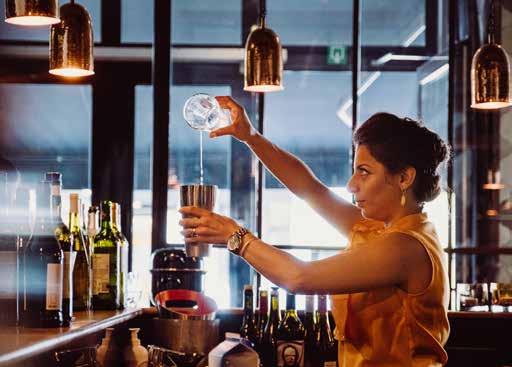
NICE TO KNOW In the Michelin two-star restaurant ’t Zilte, Gault&Millau named Sepideh Sedaghatnia Sommelier of the Year. After that, she opened her own business in Antwerp: Divin, a gastrobar with French and Mediterranean cuisine, with Iranian influences. She appeared as a jury member on the popular TV programme My Pop-up Restaurant, launched her own caviar line and has written 3 books.
designed all of the personnel's clothing and sketched out ideas for the dishes. 'I worked with a local ceramicist. I had a very clear idea of what I wanted, and I'm still happy with the results. The person who made the dishes undoubtedly cursed now and then, because my design was very different from his normal creations, and the dishes had to be dishwasher safe, to boot. It took a lot of work, but look: four years later, it looks as good as ever.'
Luxury for everyone
I ask her if she works on her home interior, as well. She smiles broadly and says, 'I'd love to, but I'm hardly ever there. It's em barrassing, actually, how little attention I pay to the decor and details at home. But when you're so intensively focussed on choosing the right glass and the right fork, day in, day out, you have enough of it at some point. At home, I've got to be able to let it go. There, it's most important for it to be cosy.'
No luxury for the sake of luxury for Sepideh. And yet, she's got her own caviar line, and the champagne flows abundantly in her gastrobar in Antwerp. 'I do, indeed, work with luxury products, but I want to offer them to as broad an audience as pos sible. From the very beginning, keeping our gastronomy and products accessible and affordable has been an essential part of our vision. I don't like decadence. You can dress a small portion of caviar and give people an exclusive flavour experience. Because that's what it's all about: the ex perience, not the price of the product. It's funny, one of our photographers told me just last week, "Wow, Sepi, since you got into caviar, it's suddenly become hip."' She laughs. 'I don't know if that's completely true, but I hope it is. If so, I've achieved my goal: putting an old-fashioned product back on the map, for everyone.'
The first customers arrive, and the photographer still needs to take some pic tures. She checks the reservations on her phone again. 'Oh dear, that went quick. Apparently, we've got a full house again.' And I sense that it's time to wrap things up. In closing, I ask her whether 2019 has been a good year (as you would for wines). She completely ignores my lousy play on words and enthusiastically confirms, 'Absolutely, an excellent year. It's been very busy, and I'm looking forward to launching many new projects this autumn. I've been work ing on them for a long time now.' A vague answer. This mysterious beauty knows how to keep people in suspense. 'What do I hope the future will bring? A travel programme maybe, in which I visit all of the vintners around the world that I like. Sharing their passion and stories would be fantastic. They should call me!' She laughs. Because she always loves to travel: getting to know new cultures, flavours and peo ple. She confesses that she doesn't know whether she'll stay in Belgium. 'But who knows that with any certainty? You've got to live in the moment, enjoy what you've got now. My parents don't agree with me. They always want to save for the future. When I travel, I spend freely. I don't want to think about what things cost. After months of hard work, I reckon I've earned it. My days are so full now. I live my life 200%. Someday I'll slow down. Although, my friends laugh at me every time I talk about my old age:
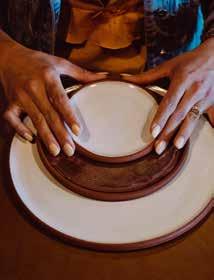
I fantasize about a laid back Sepi who visits nice markets and runs a quaint B&B. "Stop it, Grandma Sepi," they say. "You'll never be laid back."' Sepideh chuckles. -






